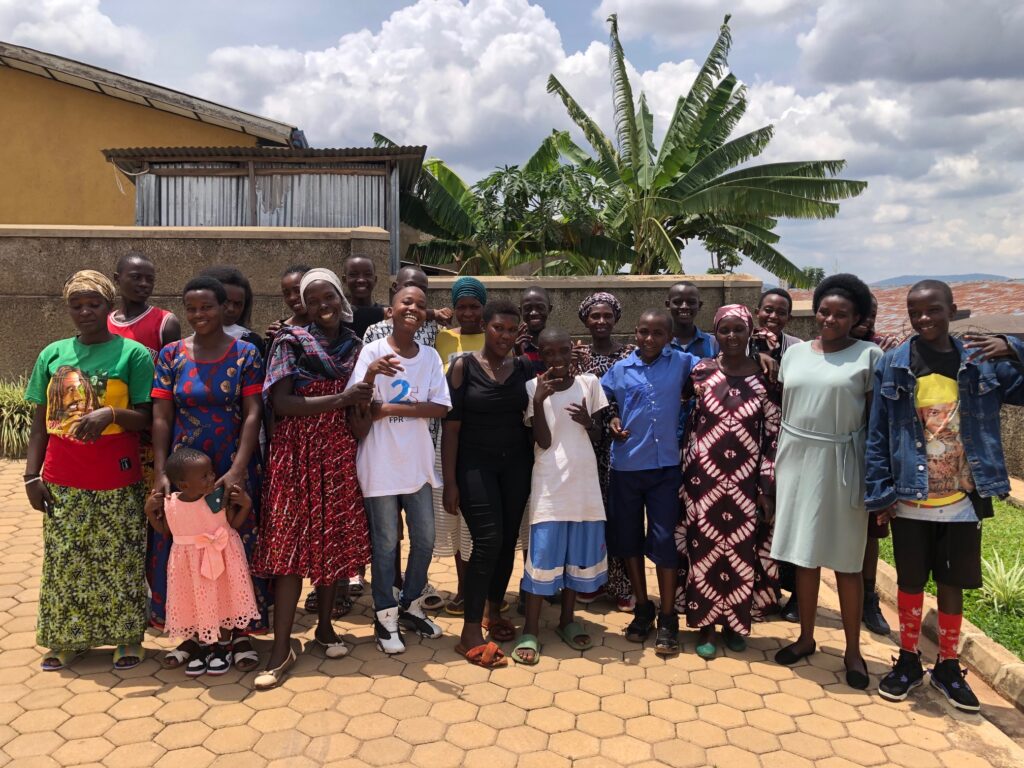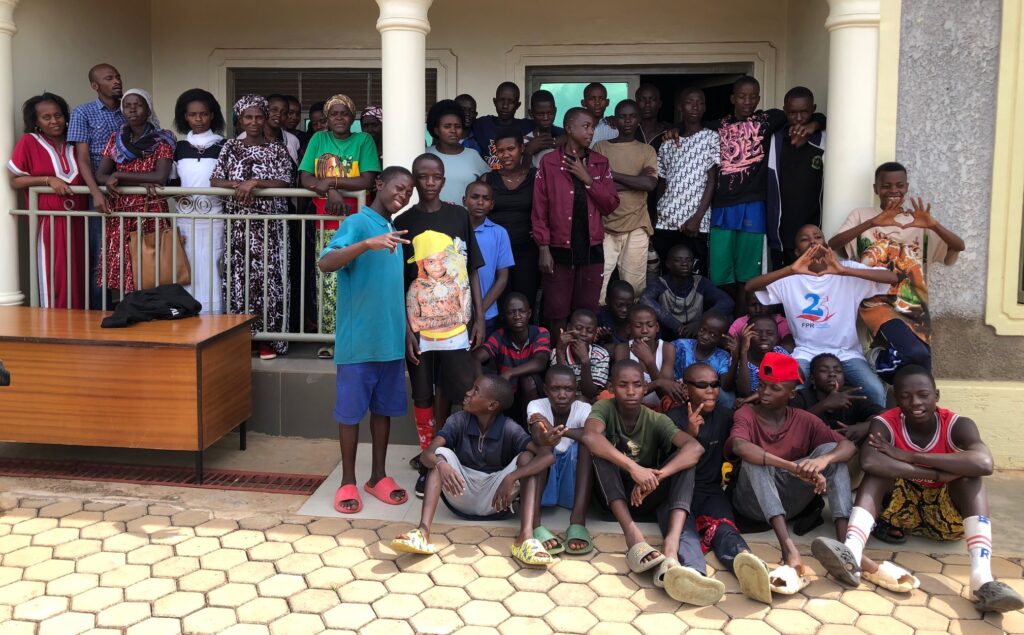Early November, Helen and Simon visited GNPDR in Rwanda and spent some time at their programmes. Here are some reflections of Helen following the visit.
Today we spent the morning with a group of about 25 young people some of whom are living on the streets of Kigali, and some of whom have now returned home and to school, after living on the streets for some amount of time. Also present were some of the mothers of those who have now returned home.
It was a very insightful day as we heard stories and reflections from young people and from mothers – about why they were on the streets and what had been the trigger factors for them running away from home; about why some had chosen to return to home and school; and hearing the mothers’ perspectives on the experiences of their offspring, and the input of GNPDR and their outreach programme which is run by Jeremiah and Angelique.
When Jeremiah and Angelique go to the streets to meet with the children, their main focus is building trust, showing non-judgemental acceptance and speaking of God’s unconditional love for each child in practical, accessible ways. There is also the sharing of some simple messages: the importance of getting back to school, the importance of returning home (where that is possible), stop doing drugs and glue sniffing, stay as healthy as possible (including dental hygiene so as to not lose their teeth), respect and listen to their parents, don’t steal or commit other crimes as that leads to being held in a detention centre. Simple messages, but ones that are getting through, based on the stories we heard, and ones that, along with the ongoing presence and support, are playing a part in helping young people make better choices.
To give more insight into the reality behind the lives of some of the young people, what led to them being on the streets, and then what helped them leave the streets, here are a few responses that some of the young people and their mums gave to some questions that I asked.
First off, I asked why the young people had left home in the first place. The dominant response was due to poverty: there was no food or clothing at home, and they had seen people of their age who were homeless but who had more money than they did, so they figured that living on the streets must be more lucrative than living in poverty at home. Others said that is was also due to poverty, and being continuously hungry, and yet it was peer pressure from other street kids that led to their decision.
Some spoke of being aware that their parents were struggling to pay the rent and find food, so they figured that if they left home, it would be one less mouth for their parents to feed, and if the parents couldn’t pay the rent they’d end up homeless anyway, so might as well just go to the streets of their own accord.
When the mothers gave their perspectives, it was essentially the same story of poverty, but with the added dimension of marital challenges, being a single parent, and having to make decisions between paying the rent or feeding the family. The mothers also spoke of how they struggled when their children asked for some simple things like a new piece of clothing, or schoolbooks so that they could be the same as their friends, and how bad it felt to not be able to meet those requests. Most of the mothers had at one time or another been homeless with their children due to inability to pay the rent. And that was despite them trying to find work, or hold down small jobs, or even hold down two small jobs. It was heartbreaking to hear how hard they had tried to keep things together, but life just seemed to conspire against them, with the outcome of their children deciding that the streets sounded like a better option.
One other reason that was cited by one of the mums was conflict in the family, especially when the mum married again and had children with her new husband. At that point, often the stepfather would disown the older children of the previous husband, with them ending up on the streets if there was no extended family who could take them in. Fostering isn’t really a thing over here, so it only happens very rarely, and then it is by word-of-mouth persuasion rather than through any sort of official channels.
Having got some insights into why the children left home for the streets, I then asked them why they had changed their minds and decided to return home and to school. The responses for this included a lot of references to the realisation that life on the streets was not all they had hoped for, that it included a lot of beatings by the police and time spent in detention centres, and that maybe school was a better place. The input from GNPDR featured heavily in the reasons for deciding to give home another go, and it was clear that the young people hold Jeremiah and Angelique, and their caring, reliable presence in very high regard.
Some of them said how they had realised that friends who had stayed in school were now getting ahead in grades, and there was clearly a competitive edge coming out as they decided that they needed to get back to school so that they could try and catch up.
One lad said how he had ended up in a detention centre, and the workers there had told him to try and get back to school. He had been dependent on glue sniffing before he was detained, but went cold turkey in the detention centre, and then, with the words of advice ringing in his ears, he left the detention centre and bumped into Jeremiah and Angelique who gave the same advice. At that point the lad decided that maybe it was worth having a go – he’s not returned to the streets since!
The conversation then turned to the mums again, and I asked them about their reflections on the experience of having their sons back home. The responses were overwhelmingly that they were happy to have them back, and relieved that they are back in school, but they all spoke of how it is still so hard to make ends meet. Some continue to have to make decisions between rent and food on some days, and they all yearn for more reliable work, or opportunities to start small income-generating projects so that they can be more financially self-sufficient.
All the young people who were there said how the streets don’t hold any attraction to them anymore, and their aim is to get on at school and find a way to have a better life than being stuck in poverty. Indeed, when I asked them what they would like to be when older, their responses included being a footballer, an investor, a pilot, a human-rights lawyer, a soldier, an engineer, a doctor, a driver, a local government officer and the president!
I felt very honoured that these lads and their mums were willing to share their stories and thoughts with me, and to be open about what they have been through. It was definitely a conversation that will stay with me.






